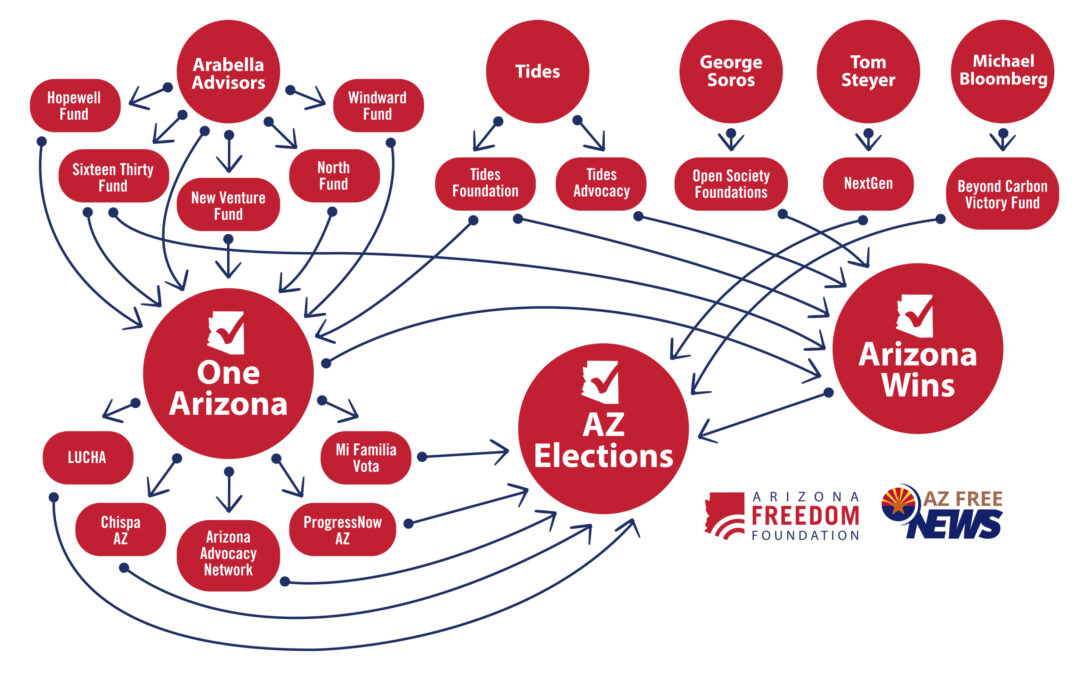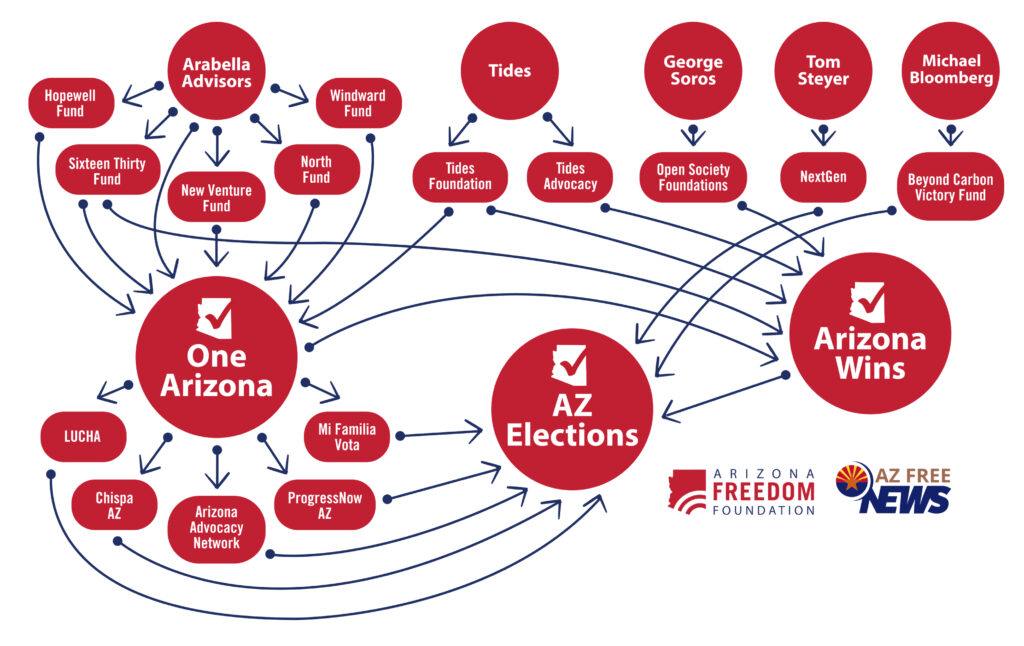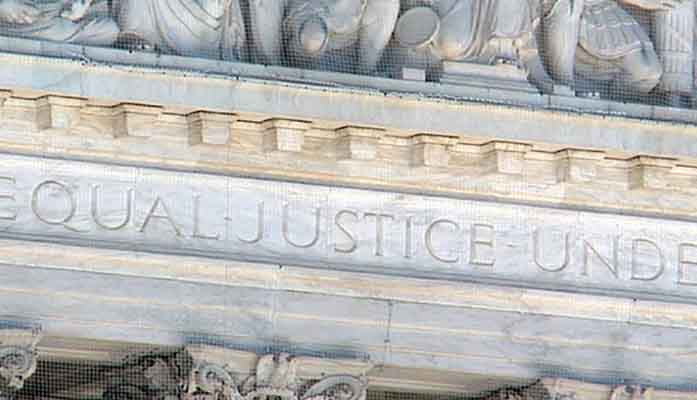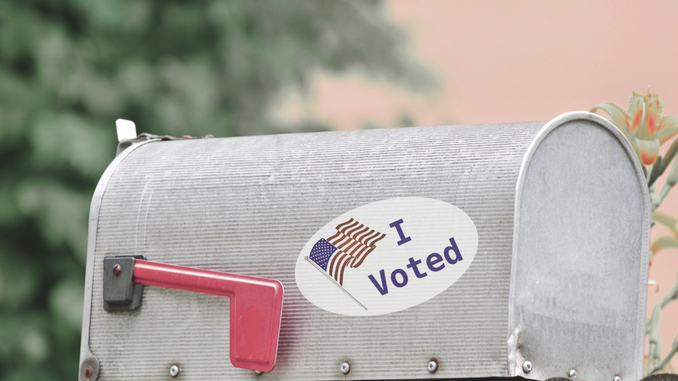
The Left’s Secretive Infrastructure to Flip Arizona Blue
By Corinne Murdock |
“This is what Arizonans have been asking for: a voting system that enhances our democracy and increases participation. It’s that simple… We know that when more people get involved and have a say, we have a state that reflects what Arizonans actually want.”
— Arizona Democratic Party Chairman, Senator Raquel Terán (D-Phoenix), speaking at a July 7 press conference about the now-invalidated, dark-money fueled Arizonans for Free and Fair Elections 2022 ballot initiative to roll back voter ID, allow same-day registration, allow outside money into elections offices, and thwart challenges to future ballot initiatives and election results.
– – –
There’s a powerful, secretive infrastructure gunning to flip Arizona blue. Its elements appear disparate, coincidental at best. In truth, each element has a specific role to play: some transient with the fervor and impact of an October surprise, others established with the consistency and familiarity that eludes scrutiny. It is the seeming disconnection of these elements that makes the left’s secretive infrastructure that much more powerful.
The principal source of power is money, and though the left often complains about dark money, they are its principal cultivator by far. Despite this fact, they’re very much in favor of a purported solution to dark money on the November ballot: the Voters Right to Know Act, or Proposition 211. Upon closer examination, the rationale for their support is clear: this proposition comes with neat carve outs ensuring that leftist dark money critical to their Arizona infrastructure remains untouched — namely from corporate media, Big Tech, most labor unions, and “nonpartisan” political action committees. If the proposition is successful, it will enable leftist actors to continue building onto their secretive infrastructure to gain a greater hold of Arizona politics.
If money is the lifeblood, then the body of the left’s secret infrastructure exists in the coordination of 501(c)(3) and 501(c)(4) nonprofits (C3 and C4, respectively), pop-up groups run by nonexistent people and entities that only exist for a few weeks around elections, mystery shell campaigns acting behind a veil on behalf of the Democratic Party and leftist organizations, and political action committees (PACs) dressing up their activity as grassroots work.
Dark money describes a shuffling of funds that intentionally obscures its origins and, ultimately, shapes its targeted political landscape to its liking. This shuffling is accomplished through networks of nonprofits, national organizations backed by a powerful few whose resources eventually shuffle down to more localized organizations.
As you read this article, more discernible traces of this leftist infrastructure are busy at work all around you. In the coming weeks, you will likely notice their fingerprints in campaign ads from groups with unfamiliar, novel names online, on the radio, on TV, and in your mail.
Some of those ads will originate from the Future Forward (FF) PAC, a D.C.-based organization funded initially by Facebook co-founder Dustin Moskovitz and a favorite of Silicon Valley Democrats. According to a trigger report, they paid nearly $246,500 collectively in recent weeks for ad campaigns opposing three of former President Donald Trump’s endorsed candidates: Mark Finchem for secretary of state, Kari Lake for governor, and Abraham Hamadeh for attorney general. Their ad buys were estimated to be a little over $82,100 per candidate.
Since nonprofits aren’t legally obligated to disclose their donors, even for election expenditures, they may trade funds back and forth in the dark at will. Effectively, the leftist infrastructure “washes” the money before it reaches its final destination — they’re arguably the best at it.
The leftist infrastructure far outspends the right. For example, in the 2020 Arizona Corporation Commission race, the left backing Democrats had around $10.2 million in outside spending versus Republicans’ $156,000.
A vast majority of this “washed” money traces back to a few with deep pockets: the Arabella Advisors (Washington, D.C.), the Tides Foundation (San Francisco, California), and George Soros (Katonah, New York). Each boasts revenues and expenditures in the billions annually.
Arabella Advisors issues funds through five distinct nonprofits: the Hopewell Fund, the Sixteen Thirty Fund, the New Venture Fund, the North Fund, and the Windward Fund. In the 2020 election, Arabella Advisors’ nonprofits funneled vast amounts of money into Arizona. The company has nearly $10 billion at its disposal. Their current president and CEO is Rick Cruz.
Arabella Advisors launched in 2005 under Eric Kessler: a self-described “serial entrepreneur” whose career began elsewhere within the left’s network, working as a national field director for the League of Conservation Voters (LCV). When the LCV executive director at the time, Bruce Babbitt (also former Arizona attorney general and then governor), moved up in the political world with the election of President Bill Clinton, Kessler got a boost, too. He became an Interior Department appointee under Babbitt. Once the Clinton administration ended, Babbitt joined former secretary of state Madeleine Albright’s National Democratic Institute (NDI), and shortly after, he launched Arabella Advisors. He remains a senior managing partner for the organization.
The Tides Foundation is one of many nonprofits within a larger network underneath the Tides Network, which is part of the Tides Nexus. It’s similar to another nonprofit within the network, Tides Advocacy (formerly the Tides Advocacy Fund, the Advocacy Fund, and the Tsunami Fund). The Tides Foundation is chaired currently by Roslyn Dawson Thompson, the former president and CEO of Texas Women’s Foundation (formerly Dallas Women’s Foundation), another left-wing nonprofit.
The Tides Foundation began in 1976 with Drummond Pike, a liberal political activist allied with Wade Rathke, who founded the defunct advocacy group esteemed by Secretary of State and gubernatorial candidate Katie Hobbs, Association of Community Organizations for Reform Now (ACORN). The organization received initial financial backing from Reynolds tobacco heiress Jane Lehman, who chaired the organization until her death in 1988.
Finally, George Soros is considered a principal financial backer for a wide array of Democratic Party efforts. Soros channels funds to various Arizona PACs and organizations through his Open Society Foundations (OSF). He also channeled funds through his Democracy PAC, which funneled over $1 million at least into Arizona for the 2020 election to Not Our Faith, Arizona Wins, and ProgressNow Arizona, respectively. The Democracy PAC gave $100,000 last year to Way to Lead PAC, chaired by Dacey Montoya. Montoya, also former chair of the now-inactive Not Our Faith, also owns the Money Wheel: a consulting firm that Democratic candidates and groups have paid hundreds of thousands into since 2018.
The C3-C4 Relationship
Leftist C3 and C4 nonprofits have a unique codependency in Arizona. While both receive tax-exempt income, C4s may engage in political activities like lobbying and campaigning while C3s generally may not.
Since C4s may engage in election activities, politically driven C3s fund C4s. However, those C3s don’t stop there. They ensure that their funds are spent properly by coordinating through grassroots lobbying. In contrast to direct lobbying, grassroots lobbying mobilizes the public on political issues.
In Arizona, major politically driven C3s include AZ Wins, One Arizona, ProgressNow AZ, and Save Our Schools Arizona (SOSAZ) Network.
One Arizona exemplifies the C3 to C4 relationship. This C3 nonprofit is a coalition of leftist groups, among which is Mi Familia Vota, a C4. One Arizona routes funds to Mi Familia Vota and coordinates grassroots lobbying efforts. Their biggest funders include the Tides Foundation, George Soros’ Open Societies Foundation, and several different organizations under Arabella Advisors.
C3 resources and support put the wind in C4 sails. In 2020, it was Mi Familia Vota that successfully sued to extend the voter registration deadline another 18 days — just 11 days before the Election Day.
The Pop-Up Groups
Another integral component of the left’s secretive infrastructure exists within various “pop-up groups.” These are political groups that appear shortly before an election and become inactive after the election ends, made up to appear like an authentic group of concerned citizens and not political activists working on behalf of a party.
Oftentimes, the identifying information given by these pop-up groups upon registration is untraceable: faulty or fake phone numbers, addresses, and personnel. Yet somehow, even with their tight deadline and obscurity, these pop-up groups manage to have enough voter contacts and resources for mass outreach efforts.
This year, a pop-up PAC by the name of “Defend Arizona Rights” registered in late June. As of this report, nearly all of their income — which came from Damon Ely, a Democratic state representative and attorney from New Mexico — went toward a website to oppose Proposition 309 (SCR1012), the ballot measure to require voter ID.
A prominent example of a pop-up group from 2020 was “Arizonans for Energy Independence,” which focused on the Arizona Corporation Commission race. They registered with the secretary of state about two weeks before the election. Their listed phone number led to an alarm business, their address was a shipping service location, and the only listed officer appears to be a ghost. Those who signed petitions from NextGen America received text from Arizonans for Energy Independence in late October.
NextGen America (formerly NextGen Climate) is one of multiple major leftist C4s that bankrolls the leftist infrastructure.
The Shell Campaigns
Much like pop-up groups, leftist shell campaigns are driven and largely funded by a political party. Unlike pop-up groups, however, these shell campaigns last for the entire election year and usually hire several identifiable staffers. Markers of a shell campaign include political attack-dog websites, ad campaigns, and artificial demonstrations staffed by professional activists staged to look spontaneous.
One example of a shell campaign from 2020 was Arizona Families First — not to be confused with Arizona Families F.I.R.S.T., an Arizona Department of Child Safety (DCS) program for parental substance abuse.
The Arizona Families First PAC was live for all of 2020, then went inactive after the election. The Arizona Democratic Party was the primary bankroller, pouring $1.7 million total into the PAC; the party launched the PAC with $45,000 contributions from February to March of 2020.
The PAC spent close to $2 million altogether on outreach: over $1 million on mailers, $916,900 on digital ads, $25,000 on radio ads, and $10,800 on its website. It also spent nearly $21,000 on legal services from Coppersmith Brockelman — a go-to law firm for Democrats, from which the newly appointed Biden nominee for the Ninth Circuit Court of Appeals, Roopali Desai, hailed. The director of Arizona Families First, Ramon Alvarez, earned over $70,400.
With the 2020 election concluded and their work done, the PAC refunded their remaining $15,400 back into the Arizona Democratic Party last February.
Other major funders of the Arizona Families First PAC included tens of thousands respectively from the National Institute for Reproductive Health Action Fund, Healthcare Rising AZ, Working for Working Americans Non-Federal Arizona PAC, 314 Action Victory Fund, and Trilogy Interactive.
Several corporations gave thousands to the PAC: Zillow, Pepsi, Intuit, and Sanofi. Additionally, the PAC received a smaller donation from one of the prominent families contributing to the state’s leftist infrastructure: Abby Rockefeller.
An example of a shell campaign from this year was Arizonans for Free and Fair Elections PAC. They launched last December with the purpose of getting their eponymous initiative on the ballot, which aimed to roll back voter ID, allow same-day registration, allow outside money into elections offices, and thwart challenges to future ballot initiatives and election results. AZ Free News issued a detailed report in July on the leftist infrastructure funding behind this shell campaign.
According to the secretary of state’s campaign finance reporting site, the last expenditure for that shell campaign was $50,000 to the Barton Mendez Soto law firm last November — a month before the PAC registered with the secretary of state.
The Left’s Use of Arizona-Based PACs to Shuffle Money
There are over 900 PACs listed as active through the Arizona Secretary of State. Of these, a handful serve as consistent conduits for the leftist infrastructure’s funds under the title of grassroots work. These include One Arizona/Arizona Wins, Mi Familia Vota, Arizona Advocacy Network, ProgressNow AZ, Living United for Change in Arizona (LUCHA), Opportunity Arizona, Mijente, PODER in Action, Forward Majority Action Arizona, Way to Lead Arizona (Way to Lead PAC), and Future Now Arizona.
None of them broke the secretary of state’s campaign finance top ten for major income and expenditures this year. There are others who made that list: those who have raised and spent mass amounts of funds in a short window of time this year. They may be classified as shell PACs integral to the leftist infrastructure since they assume a local identity while receiving and distributing funds from out-of-state Democratic billionaires and the three primary financiers of Democratic money (Arabella Advisors, Tides Foundation, and George Soros).

According to the secretary of state’s campaign finance portal, these are the PACs with the top 10 incomes this year:
- $8.2 million, The PAC for America’s Future – AZ
- $7.6 million, Arizonans for Free and Fair Elections (review previous section for details)
- $3.5 million, Arizonans Fed up with Failing Healthcare, or Healthcare Rising AZ
- $2.2 million, Put Arizona First
- $2 million, Worker Power PAC
- $1.4 million, Our Voice Our Vote Arizona PAC
- $1.3 million, DLCC Victory Fund
- $775k, ActBlue Arizona
- $737k, Arizona Pipe Trades 469
- $665k, United Food & Commercial Workers Union of AZ Local 99
And these are the PACs with the top 10 expenses this year:
- $5.2 million, Republican Governors Association (RGA) Arizona PAC
- $3.4 million, Arizonans Fed Up with Failing Healthcare (Healthcare Rising AZ)
- $3.3 million, The PAC for America’s Future – AZ
- $2.2 million, Put Arizona First
- $1.5 million, Republican Attorney Generals Association (RAGA) Arizona for Freedom PAC
- $1.3 million, Arizonans for a Just Democracy
- $885k, Planned Parenthood Votes
- $817k, Southwest Regional Council of Carpenters Legislative Improvement Committee
- $800k, National Rifle Association (NRA) Political Victory Fund
- $786k, Arizona Pipe Trades #469
Of all these PACs, a prime example of the left’s money “washing” that’s also most cryptic in its origins and nature would be Arizonans for a Just Democracy. The PAC launched last July, with a mailing address located at the same UPS store in Phoenix as ProgressNow Arizona and Arizona Wins. Their website hasn’t been updated since their launch.
Arizonans for a Just Democracy only has four donors listed, of which three are: Merle Chambers, millionaire Democratic funder; the Arabella Advisors’ Sixteen Thirty Fund, and a ghost of a PAC called “The Future We Want.” That last PAC also has a mailing address at the same UPS store; its chair is Juliana Horwin, a former educator with the Arizona Education Association (AEA).
According to the Federal Election Commission (FEC), a similarly named Super PAC was active from 2018 to 2019 and its sole financier totaling $547,000 was a Phoenix-based PAC called “Citizens for Accountable Government” (yet somehow it spent over $716,000). Citizens for Accountable Government’s mailing address is also located at the same UPS store and shares the same treasurer as The Future We Want, Isis Gil of the Puente Human Rights Movement. Citizens for Accountable Government’s chair is Chris Love: the former Planned Parenthood Advocates of Arizona (PPAZ) chair. Their primary funds come from either The Future We Want or Arizona Wins.
Arizonans for a Just Democracy’s chair, Grecia Lima, is the national political director for Community Change (also known as Center for Community Change) and its advocacy arm, Community Change Action. Community Change receives mass funding from the Democratic network: Democracy Alliance, AFL-CIO, Planned Parenthood. The PAC’s treasurer is Sarah Michelsen: the senior campaign strategist for the ACLU, and as of June 2021 the owner of “Michelsen Strategies,” a Phoenix-based campaigning firm. From the moment Michelsen launched her firm until present, she’s raked in at least $18,300 from the Arizonans for a Just Democracy PAC.
Michelsen has worked with the Center for Progressive Leadership, Arizona Wins, NARAL Pro-Choice Arizona, Planned Parenthood Advocates of Arizona, and Bernie Sanders’ presidential campaign.
Then there’s PAC for America’s Future – AZ. Of their $8.2 million in income this year, not even half of a percent came from Arizonans ($16,800, composed of many individual donations ranging from $25 to $1,000). The vast majority of the PAC’s major funding came from Democrat billionaires. This PAC plays an integral role in ensuring Arizona’s leftist infrastructure is relied upon both locally and nationally — it passes along funds to PACs, organizations, and committees across other states. Only $106,000 went to Arizona candidates, all Democrats; $260,000 went to the Arizona Democratic Party. That’s four percent of their income this year.
As AZ Free News reported in August, about half of Healthcare Rising AZ’s funds came from the California union, SEIU United Healthcare Workers. Its main expenses were for signature-gathering efforts for its Predatory Debt Collection Act, a ballot initiative to thwart debt collection efforts.
The RGA Arizona PAC receives its funds from its national affiliate, the Republican Governors Association, and all of its expenditures went toward ad campaigns against Democratic gubernatorial candidate Katie Hobbs.
RAGA Arizona for Freedom has spent nearly equal amounts of over $700,000 each on ad campaigns to support Republican attorney general candidate Abraham Hamadeh and oppose Democratic attorney general candidate Kris Mayes.
Likewise, the NRA Political Victory Fund spent nearly equal amounts of over $400,000 each on ad campaigns to support Republican gubernatorial candidate Kari Lake and oppose Democratic gubernatorial candidate Katie Hobbs.
This is Part One in a series on the Democratic dark money network in Arizona. Be sure to sign up for our newsletter to be notified of Part Two in the series.
Corinne Murdock is a reporter for AZ Free News. Follow her latest on Twitter, or email tips to corinne@azfreenews.com.




